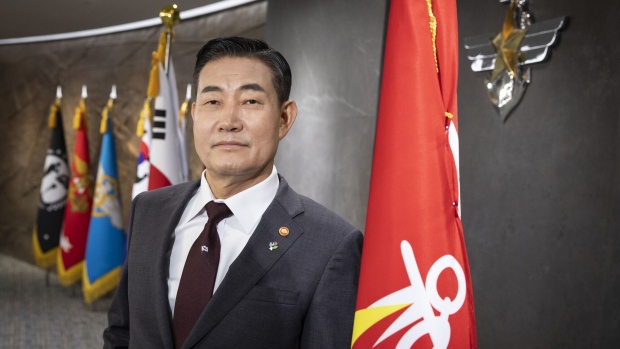Jun 16, 2024
US, South Korea, Japan to Lock In Security Ties Before Inauguration
, Bloomberg News

(Bloomberg) -- The US, South Korea and Japan will sign a deal to formalize their security partnership against threats from North Korea’s nuclear weapons, cementing ties before America inaugurates its next president in January.
South Korean Defense Minister Shin Wonsik said in an interview with Bloomberg News that he will soon meet his US and Japanese counterparts to sign the pact known as the Trilateral Security Cooperation Framework.
“A priority would be to establish a system to more effectively, promptly and coherently respond to North Korea’s nuclear and missile threats among South Korea, the US and Japan, and to make that irreversible,” he said in the interview in his office in Seoul on Friday.
The framework would likely build on a landmark summit among the leaders of the three countries last year that included practical steps to counter threats by North Korea such as real-time data sharing on missile launches, and moves to bind the trilateral relationship so tightly that it would be hard to unravel.
“It will be signed within the second half of this year. We are arranging the schedule to meet as soon as possible,” Shin said.
Japanese Defense Minister Minoru Kihara told parliament he was looking at a 2+2 meeting of the defense and foreign ministers of the two countries, Kyodo News reported. When asked on this, Shin said nothing has been specifically planned yet although he wants to further develop ties with Japan.
The three countries over the past year have held joint military exercises for countering missile strikes and hunting for submarines. Later this month, they are planning drills in air, sea and cyberspace in what is billed as a first of its kind trilateral multidomain exercise, Yonhap News reported, adding the US plans to dispatch its USS Theodore Roosevelt aircraft carrier group for the training.
There has been speculation South Korean President Yoon Suk Yeol and Japanese Prime Minister Fumio Kishida could again meet President Joe Biden when the Asian leaders are expected to travel to Washington in July for a NATO summit. The cooperation among the US and its two powerful allies has reached some of their strongest levels, after facing troubles during former President Donald Trump’s term.
Trump caused friction with Tokyo and Seoul by demanding hefty spending increases for hosting US troops. He also scaled back or halted major joint training drills while he held talks with North Korean leader Kim Jong Un, who modernized his missile arsenal, developed new nuclear warheads and increased his stockpile of fissile material during Trump’s tenure. North Korea for decades has demanded a halt to joint drills, calling them a prelude to an invasion.
Putin Visit
Kim is likely to meet President Vladimir Putin this week, South Korea’s DongA Ilbo newspaper reported, in what would be the Russian leader’s first trip to North Korea in 24 years. The visit would stoke concerns from the US and its partners over arms transfers that have helped the Kremlin in its assault on Ukraine in exchange for aid to prop up Kim’s regime.
During a meeting between the two in September in Russia, Putin pledged to help Kim in his plan to put an array of spy satellites into orbit. Kim had suffered an embarrassing setback in May when a rocket to deploy a satellite blew up in a fireball shortly after liftoff.
Shin said Russia appears to have provided new engine technology to North Korea, although a trouble in integrating the system likely led to the launch ending in failure. North Korea’s state media said the trouble was caused by problems with a newly developed engine that used liquid oxygen and petroleum.
“They are exactly Russia’s latest engine technologies,” Shin said, adding Pyongyang has effectively admitted to receiving support from Russia by listing the cause of the accident. “North Korea is believed to be continuing engine tests at the moment and we believe they will try another launch in the second half.”
Seoul has detected at least 10,000 shipping containers being sent from North Korea to Russia, which could hold as many as 4.8 million artillery shells of the likes that Putin has used in his bombardment of Ukraine, Shin said. He expects Putin to ask for even more munitions and ballistic missiles from Kim during the visit.
It’s unclear if Putin would transfer Russia’s most advanced military technology, Shin said, adding the possibility is “very low.”
“If Russia decides to transfer, that would mean Russia completely losing leverage over North Korea. So they will likely leave it as a last resort and I don’t think North Korea has much to give Russia to entice it to give up on its last resort,” Shin said.
--With assistance from Emily Yamamoto, Katria Alampay and Jenny Lee.
©2024 Bloomberg L.P.





